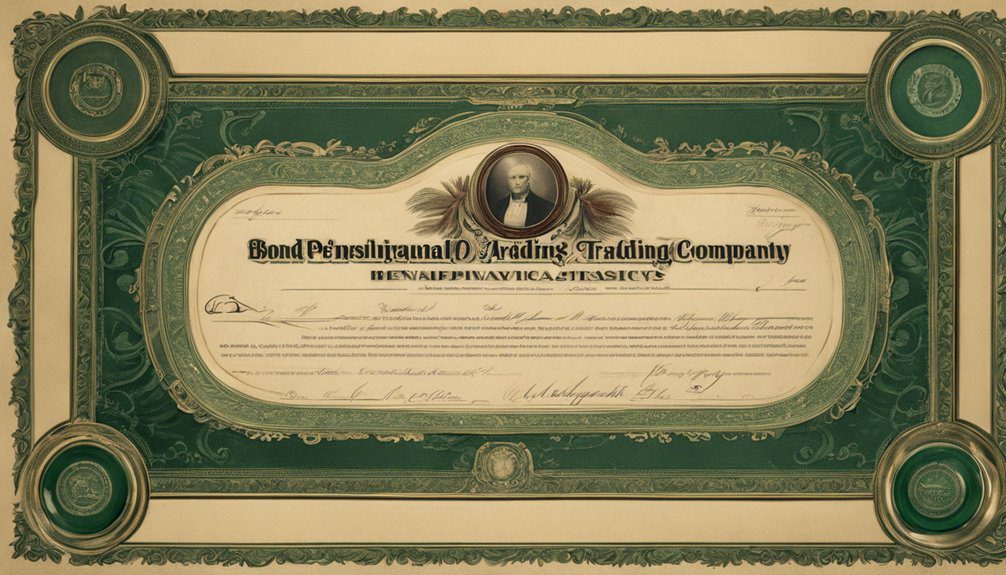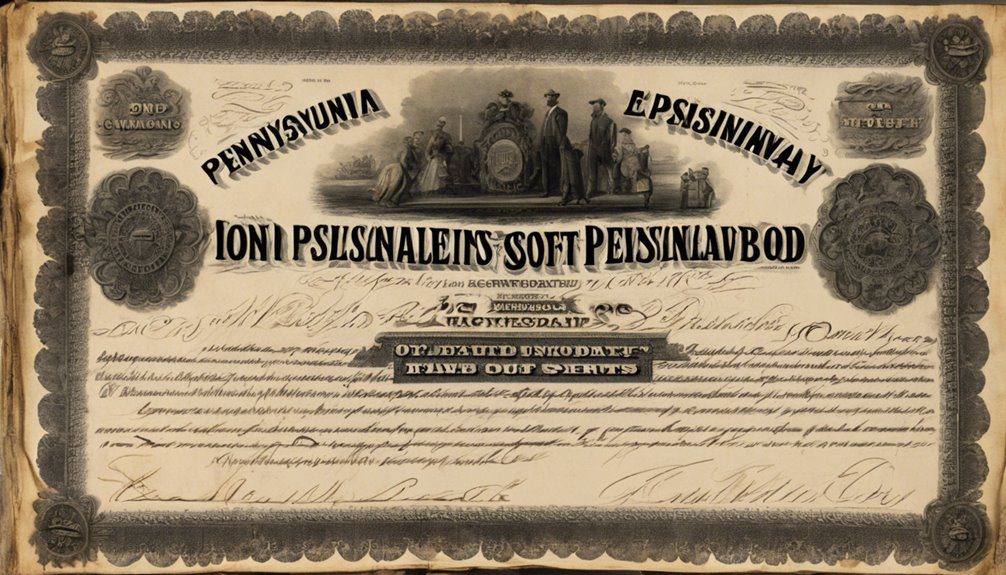When you're navigating the financial markets in Pennsylvania, understanding the Trading Assistant Company Bond becomes essential for both compliance and protection. This bond not only secures your interests but also enhances the credibility of trading assistants, fostering a trustworthy environment. You might wonder how it impacts your dealings or the overall market landscape. What are the specific requirements and potential repercussions for those who fall short? The answers could significantly influence your approach to trading in Pennsylvania.
Overview of Trading Assistant Bonds

When you explore trading assistant bonds, you'll find they're essential for ensuring compliance and protecting clients' interests in the financial market. These bonds act as a financial guarantee, assuring that trading assistants adhere to regulations and ethical standards.
Essentially, they serve as a safety net, providing clients with peace of mind while engaging in trading activities. Trading assistant bonds require companies to secure a specified amount of money, which can be claimed if the assistant fails to meet their obligations.
This requirement helps to deter misconduct and encourages responsible behavior among trading assistants. You'll discover that these bonds vary in terms of amount, depending on the specific state regulations and the nature of the trading activities involved.
Moreover, the bond helps foster trust in the financial system. When clients know that a trading assistant is bonded, they're more likely to feel confident in their decisions.
In Pennsylvania, understanding the details of trading assistant bonds is crucial for anyone looking to enter this sector. They not only protect clients but also enhance the overall integrity of the trading environment, making them a vital component of the financial landscape.
Importance of the Bond
Securing a trading assistant bond is crucial for both the assistants and their clients, as it directly impacts trust and accountability in financial transactions. When you choose to work with a trading assistant who holds this bond, you're ensuring that they're committed to ethical practices and adhering to industry regulations.
This bond acts as a safety net, providing financial protection should any misconduct or negligence occur.
For clients, this bond instills confidence. Knowing that there's a financial guarantee in place means you can engage in trading activities with peace of mind. If a trading assistant fails to meet their obligations or engages in fraudulent behavior, the bond can cover losses, allowing clients to recover some of their investments.
For trading assistants, having a bond not only helps build your reputation but also demonstrates your professionalism. It shows you've taken the necessary steps to protect your clients, which can lead to increased business opportunities.
In a competitive market, being bonded can set you apart and attract more clients who value security and reliability. Ultimately, a trading assistant bond is a vital component for fostering strong, trustworthy relationships in the trading community. Additionally, many states require debt consolidator bonds as a measure to protect consumers from unethical behavior, highlighting the importance of these financial safeguards.
Eligibility Requirements

To qualify for a trading assistant bond, you'll need to meet specific eligibility requirements that ensure your credibility and competency in the field.
First, you must be a legal resident of Pennsylvania, or if you're a business entity, you should be registered to operate within the state. This residency requirement helps to establish a local presence and accountability.
Next, you'll need to demonstrate a clean criminal record, particularly concerning financial crimes or fraud. This part of the requirement is crucial, as it reflects your integrity and reliability as a trading assistant. If you have prior convictions, it may disqualify you, so it's essential to be aware of your legal standing.
Additionally, you should possess relevant experience or education in trading, finance, or a related field. This experience not only enhances your qualifications but also builds trust with your clients and regulatory bodies.
Lastly, you must be able to provide financial statements that show your stability and capability to meet the obligations of the bond. By meeting these requirements, you'll position yourself as a qualified candidate for obtaining a trading assistant bond in Pennsylvania.
Application Process
The application process for obtaining a trading assistant bond in Pennsylvania involves several key steps that you must follow closely.
First, gather all the necessary documentation, including your business license, proof of financial stability, and any relevant personal identification. Having these documents ready will streamline your application.
Next, you'll need to complete the bond application form. Be meticulous when filling it out; any inaccuracies can delay the process. After submitting the application, you may be required to pay a small fee, which varies depending on the surety company you choose.
Once your application is submitted, the surety company will conduct a review. They'll assess your credit history and financial background to determine your eligibility. If everything checks out, they'll issue the bond, typically within a few days. Minnesota Surety Bonds are an important aspect of ensuring compliance and trust in business operations.
Keep in mind that some companies may request additional information during the review process, so be prepared to respond promptly.
Bond Amounts and Costs

Understanding bond amounts and costs is crucial when applying for a trading assistant bond in Pennsylvania. The state requires trading assistants to obtain a surety bond to protect clients and ensure compliance with regulations. Typically, the bond amount you'll need ranges between $5,000 and $50,000, depending on the specific requirements of your business and the regulations in place.
The cost of the bond, known as the premium, usually falls between 1% to 15% of the total bond amount. Factors influencing this premium include your credit score, business experience, and financial stability. If you have excellent credit, you're likely to pay a lower premium, while poor credit might increase your costs.
It's essential to shop around and compare rates from different surety bond providers. Some companies may offer competitive rates or flexible payment plans, which can save you money.
Keep in mind that the bond isn't just an expense; it's also a necessary investment in your business's credibility and legal compliance. By understanding these costs, you can make informed decisions and secure the right bond at a reasonable price. Additionally, the types of surety bonds required can vary by state, so it's important to be aware of local regulations.
Responsibilities of Trading Assistants
As a trading assistant, you play a vital role in managing client accounts and executing trades on their behalf. Your primary responsibility involves closely monitoring market trends and analyzing data to make informed decisions.
You need to stay updated on asset performance and economic indicators that could influence market conditions.
In addition to executing trades, you'll maintain detailed records of transactions and account balances. This ensures transparency and helps clients understand their investment performance.
You'll also communicate regularly with clients, answering their questions, providing insights, and updating them on their portfolio status. Building trust is essential, so clear and timely communication is key.
You must work closely with senior traders and adhere to company policies and trading regulations. Your ability to follow instructions and execute strategies accurately is crucial in achieving the clients' investment goals.
Furthermore, you should promote a culture of compliance by ensuring all trades meet regulatory requirements. This diligence helps safeguard both the clients' investments and your firm's reputation.
Consequences of Non-Compliance

Non-compliance with trading regulations can lead to severe repercussions for both you and your firm. When you fail to adhere to these rules, you risk facing hefty fines that can drain your financial resources. Regulatory bodies have the authority to impose sanctions, and these penalties can escalate depending on the severity and frequency of the violations.
Moreover, your professional reputation is on the line. If you're found non-compliant, clients might lose trust in your firm, leading to a decline in business opportunities. This erosion of trust can take years to rebuild, affecting your long-term success. Additionally, your ability to secure future partnerships may diminish, as other businesses are likely to hesitate in associating with a firm known for regulatory issues.
In extreme cases, non-compliance can result in the suspension or revocation of your trading licenses. This can effectively halt your activities in the market, putting your career at risk. Therefore, it's crucial to stay informed about the regulations and ensure your practices align with compliance standards to avoid these potentially disastrous outcomes. In the context of financial security, obtaining Illinois Surety Bonds can provide additional protection for your business against non-compliance risks. Make compliance a priority to protect yourself and your firm from these significant consequences.
Benefits for Consumers and Businesses
While navigating the complexities of trading, you'll find that compliance not only safeguards your firm but also brings significant benefits for consumers and businesses alike. By adhering to regulations, you foster trust and transparency in your operations. This trust helps attract more clients, as consumers feel more secure when dealing with compliant companies.
For businesses, being compliant can lead to smoother operations. You'll notice fewer disruptions from audits or penalties, allowing you to focus on growth and innovation. Moreover, a reputation for compliance can differentiate you from competitors, giving you an edge in the marketplace.
Additionally, compliance often results in better risk management. By following guidelines, you're less likely to face legal issues that could harm your business financially and reputationally. This proactive approach not only protects your assets but also encourages a culture of responsibility among employees.
Ultimately, when consumers see you prioritize compliance, they're more likely to choose your services over others. By investing in compliance and securing a trading assistant company bond, you're not just protecting your business; you're enhancing your credibility and fostering lasting relationships with your clientele. Furthermore, obtaining a license and permit bond demonstrates your commitment to operating within the legal framework, which reassures clients about your business practices.
Conclusion
In conclusion, the Pennsylvania Trading Assistant Company Bond plays a vital role in ensuring a trustworthy trading environment. By protecting clients from misconduct and promoting ethical behavior, this bond not only enhances your confidence but also strengthens the reputation of trading firms. If you're a trading assistant or a client, understanding this bond's importance can help you navigate the financial markets more safely and effectively, ultimately making your trading experience more secure and reliable.


